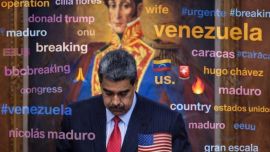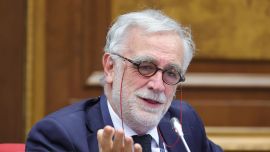Argentina has sparked controversy and dismay among its regional neighbours after announcing it will withdraw from all future negotiations over free-trade deals involving the Mercosur trade bloc.
The government, which announced its decision late Friday evening via a statement from the Foreign Ministry, said its decision was part of a move to concentrate fully on the ongoing coronavirus pandemic and its economic fall-out on the nation.
The Ministry said Argentina's participation in talks was impossible, given the "effects of the pandemic," saying the government's energies were focused on "protecting companies, employment" and the nation's poorest families.
In it statement, it complained that some of the bloc's members had proposed "an acceleration of the negotiations for free-trade agreements with South Korea, Singapore, Lebanon, Canada and India, among others," against Argentina's
"International uncertainty and the state of our economy suggest halting progress on those negotiations," it added.
The government said its decision only applied to talks on future Mercosur trade deals, adding that it would continue to work with its fellow members – Brazil, Paraguay and Uruguay – on deals already on the table, such as the yet-to-be-finalised trade deal with the European Union. That historic deal, agreed in principle last year by all parties, is awaiting ratification from both Latin American and European Parliaments.
The decision caps off a difficult few years for the regional trade bloc, which has shifted with the political winds over the past few years. At present, President Alberto Fernández looks to be in an ideological minority, with right-wing administrations in office in Brazil, Paraguay and Uruguay.
Upon learning of the decision, the Paraguayan government (which currently holds the bloc's pro-tempore rotating presidency) said the Mercosur would evaluate what "appropriate legal, institutional and operational measures" to take to ensure the decision does not "affect ... ongoing trade negotiations."
'Together we are more'
Uruguay's Foreign Minister Ernesto Talvi, meanwhile, said the decision would not "slow down progress of ongoing negotiations or others that may be launched in the coming months."
"We wish them a prompt return to the table. Together we are more," he said in a post on Twitter.
Some analysts criticised Buenos Aires' move to distance itself from its long-term regional partners.
"They abandoned ship," Pedro Miguel Costa e Silva, a Brazilian diplomat who leads regional and bilateral negotiations in the Americas, told Reuters, describing the decision as "no surprise" and based on ideology.
Speaking Monday, Foreign Minister Felipe Solá said that Argentina remained part of the Mercosur, despite the decision.
Opposition lawmakers criticised the move, describing it as an "exit" from the bloc and as counter-productive, coming at a time when Argentina needed to bring in more money to its economy.
Government officials briefed journalists over the weekend that the government's decision was based on realism rather than ideology, given the problems facing Argentina and its economy.
In an interview granted to El Destape Radio on Monday, President Alberto Fernández argued in fact that he wanted "a bigger Mercosur," before training his ire on his predecessor, Mauricio Macri, and Brazil's controversial leader Jair Bolsonaro.
"I am concerned that the Macri government allowed Mercosur to be distorted," he said, referring to attempts to allow each member of the bloc to negotiate individual trade deals. "If everyone can negotiate what they want for what Mercosur exists for?"
"Macri and Bolsonaro allowed each [nation] to make their free-trade agreement. Thus, Mercosur does not make sense. If they want to throw Mercosur overboard, tell them so."
– TIMES/AFP


























Comments